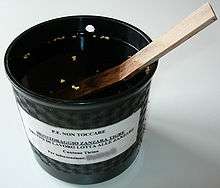Bacillus thuringiensis israelensis

Bacillus thuringiensis serotype israelensis (Bti) is a group of bacteria used as biological control agents for larvae stages of certain dipterans. Bti produces toxins which are effective in killing various species of mosquitoes, fungus gnats, and blackflies, while having almost no effect on other organisms. Indeed, this is one of the major advantages of B. thuringiensis products in general is that they are thought to affect few nontarget species.
Bti strains possess the pBtoxis plasmid which encodes numerous Cry and Cyt toxins, including Cry4, Cry10, Cry11, Cyt1, and Cyt2. The crystal aggregation which these toxins form contains at least four major toxic components, but the extent to which each Cry and Cyt protein is represented is not known and likely to vary with strain and formulation. Both Cry and Cyt proteins are pore-forming toxins; they lyse midgut epithelial cells by inserting into the target cell membrane and forming pores.[1]
Commercial formulations include "Mosquito Dunks"/"Mosquito Bits". It is also available in bulk liquid or granular formulations for commercial and public agency use.
Long name
Bacillus thuringiensis subspecies israelensis strain EG2215
Patent information
United States patent: 4,166,112
Inventor: Goldberg; Leonard J. 1979
See also
References
- ↑ Bravo A, Gill S, Soberón M (2007). "Mode of action of Bacillus thuringiensis Cry and Cyt toxins and their potential for insect control". Toxicon 49 (4): 423–35. doi:10.1016/j.toxicon.2006.11.022. PMC 1857359. PMID 17198720.
External links
- Bti fact sheet
- EPA Controlling Mosquitoes at the Larval Stage
- PAN Pesticides Database - Pesticide Poisoning Diagnostic Tool—BTI Info